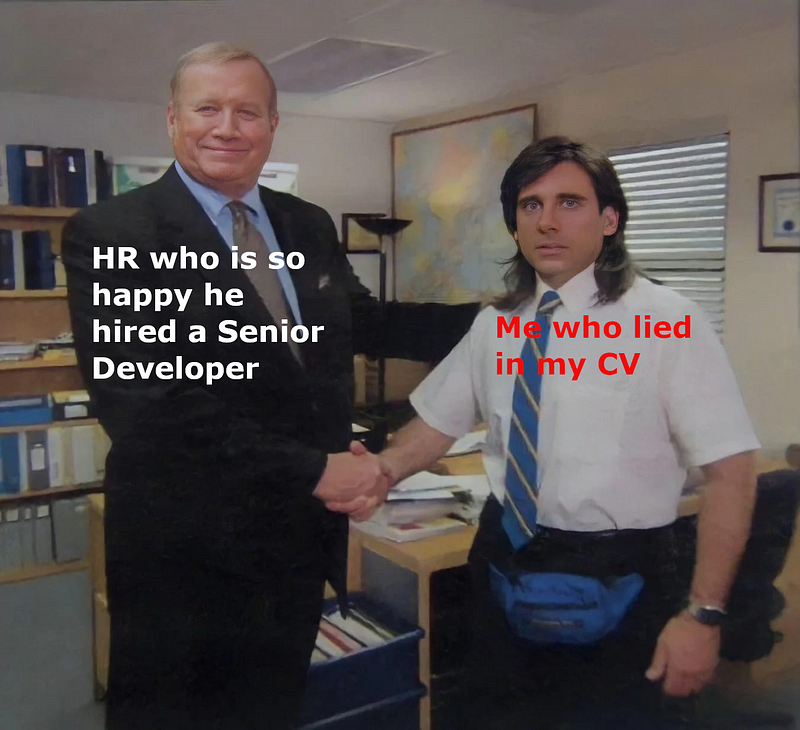The harsh reality of IT industry
The ugliness must stop here, we still have our ways out and earn more

The misleading things that they told
As I embarked on my journey to college and applied for an IT major, I was greeted with a vivid palette of promises. The prospect of this technological adventure was painted in the brightest shades of pink. The faculty regaled us with captivating tales of Pokémon Go, the mobile game that took the world by storm, and the sheer dominance of technology in shaping our future.
These narratives were captivating, enticing us with stories of individuals who had ascended to the zenith of their careers with nothing but their wits and innovation. The developer behind the overnight sensation, Flappy Bird, became a shining example of how a simple yet addictive game could catapult someone to fame and fortune.
And then there were the legends — Mark Zuckerberg and Bill Gates, who had founded tech empires that reshaped the world. Their stories served as a beacon of hope for aspiring tech enthusiasts like myself. The audacity to dream, coupled with the right idea and determination, was heralded as the path to success.
As if sharing a well-guarded secret, they whispered about the advent of Industry 4.0 into our eager ears. The promise of a future where cutting-edge technologies like the Internet of Things, artificial intelligence, and automation would revolutionize industries and the way we live. It was an enticing vision of what lay ahead, where we, the technology pioneers, would be at the forefront of change.
These stories and promises, painted in vibrant hues, fueled my passion and drove me towards an IT major. Little did I know then that the journey into the world of technology would be a challenging yet rewarding one, where the realities of code, innovation, and problem-solving would transform these colorful tales into a practical, lifelong pursuit.
I now work as a full time developer but and i’m here to tell you the truth
Math
When i first came to programming, people told me not to worry if i’m not good at math, it’s requires only logic and some basic math, this is true but they forgot to tell me about everything else that is wrong with the industry.
Everything was encapsulated so well.
During my time in school, I was introduced to creating Windows applications using ASP.NET Windows Forms. While I learned to write code for button click handlers, there was a significant gap in my understanding. They never delved into the mechanics of how these handlers were invoked, what went on under the hood, or the intricacies of interoperation with C++ code, which handled signals from the operating system when a mouse click occurred. It seemed as though the sole focus was on achieving the end result, neglecting the educational journey along the way.
Chasing game
The relentless pursuit of new frameworks and libraries feels akin to the frenzied hype surrounding each new iPhone release. It’s as if the tech world has been set on a perpetual sprint, while I’m left standing still, merely observing the whirlwind of innovations passing by.
At some point, I decided to shift my focus away from the constant chase after these emerging technologies and delved into understanding the foundational principles beneath them. This approach has served me well, allowing me to gain a deeper comprehension of the underlying concepts.
However, there’s a catch. Just as I settled into this groove, my manager swooped in with a barrage of questions about my experience with various technologies, and I found myself needing to adopt yet another framework. It raises the question: Is this constant adoption of new technologies really necessary? While novel concepts undeniably bring value, there comes a point where the sheer volume of new concepts outweighs the time investment required to master each one.
Let me clarify that I’m not averse to learning new things. However, the ceaseless pursuit of learning multiple frameworks to accomplish the same tasks no longer feels like genuine progress. It’s as if my autonomy to explore what I’m truly passionate about, and to become a better programmer in my own way, has been somewhat compromised.
We are manipulated
We seem to be caught in a whirlwind of industry trends. First, JavaScript took center stage, and then the tech world collectively embraced TypeScript for its myriad advantages. Now, in 2023, it appears we’re witnessing a shift back to JavaScript, with some questioning the true value of TypeScript’s benefits.
The same story unfolds with ReactJS and its celebrated best practices. Despite the initial acclaim, a multitude of add-ons and extensions have sprung up, all vying for our attention and suggesting that we need these additional components. It’s as if they’re trying to market their wares to us.
And then, in an unexpected turn of events, a high school student discovers a method to boost React’s performance by a staggering 70%. It’s almost comical when you think about it.
Your job is not special and you are alone on your journey
Project assignments aren’t always a matter of choice. When I completed my studies and secured my initial job, I was assigned to work on a legacy ASP Web Forms project. It was the kind of project that took a whopping 10 minutes just to run and debug. Fixing even the tiniest bug felt like an eternity, mainly because tracing a single line of code necessitated restarting the web application, which came with another 10 minutes of waiting. As if that weren’t enough, they also had me delving into automation testing because no one else was available to take it on at the time.
In the world of software development, self-reliance is key. From the very beginning, don’t anticipate someone will be there to offer you unwavering support. You’ll need to chart your learning journey independently and rely on your own initiative. While you can certainly pick up bits of knowledge from others, it’s essential to remember that, in most cases, you’ll need to proactively seek answers and information. It’s uncommon for a senior mentor to dedicate an entire hour to explain a concept to you; you must be the driving force behind your learning.
It’s not solely about coding; it’s about embracing a broader perspective. When I initially graduated, my primary focus was on delivering code. However, as I’ve progressed to become a senior developer, I find myself dedicating more time to pondering the intricacies of the business logic than actually writing code. While I often yearn for the opportunity to craft code in an innovative way, the reality is that a significant portion of my work involves handling the routine tasks, like CRUD operations.
An HR asked me once “What would be the best thing you have ever done in any project you have worked on?” and i felt like i did nothing remarkable. The only thing we had was primarily reading and writing data from database, then we solve all the overhead of writing and reading from databases.
Microservices
Microservices may seem like a panacea, but they aren’t a universal solution. While they often provide significant benefits for larger organizations, their overhead can be less justified for smaller companies and developers who’ve fallen for the hype. Through my experience, I’ve observed that outsourced developers might not prioritize performance and code cleanliness as much as their clients. Frequently, they focus on creating basic features that function adequately for a limited period. They recognize that they might not be around when issues arise, as they could be off coding or watching movies elsewhere in another outsourcing company.
Jump ship to get a raise, even new title
Here lies an unpleasant reality: sometimes, putting in extra effort within the same project won’t lead to a substantial increase in your salary. Instead, seizing the chance to switch to a different company can result in a significant salary boost. It’s not unheard of for individuals to resign, only to reapply a few months later, securing a new contract with a considerably higher salary. This situation might leave you wondering about its purpose.
The ugliness must stop here, we still have our ways out and earn more
Escape the rat race of programming
Let’s set aside all the criticism for a moment because, in the grand scheme of things, we are ultimately responsible for our own journey in the programming world. When we invest our efforts in the right places, we can still uncover boundless creativity and joy in coding. If you have a genuine passion for programming, why limit yourself to a typical 9 to 5 job? The realm of programming offers a plethora of opportunities waiting to be explored.
Medium
Medium is more than just a blogging platform; it’s a place where your insights and expertise can earn you money based on the views your content receives. You don’t have to restrict yourself to writing about new technologies and coding. Feel free to express your opinions, share your experiences, and tell engaging stories — they’re all welcome here.
Besides, you can add tips into your posts using other platforms such as buymeacoffee.
Open source contribution
While open source contributions may not directly pad your wallet, they offer an invaluable platform for constructing your reputation and displaying your achievements to a broader audience. What’s more, you can seamlessly integrate your GitHub profile into your CV, allowing potential employers to witness your proficiencies and capabilities firsthand.
Building a portfolio
Endlessly exchanging PDF resumes can be a time-consuming hassle. Instead, consider crafting your own portfolio that encapsulates your identity and showcases your work, neatly integrating your GitHub profile. This elevates your professional image and efficiently communicates your credentials. (You can check out my post about deploying portfolio in 2 minutes here).
Keep learning
Effort is the key. Don’t anticipate rewards without dedication. Continuous learning and skill expansion pave the way to advancement. Ascending to a higher role not only comes with an elevated income but also offers a broader perspective, more challenging assignments, and greater opportunities.
Acquiring certifications is a valuable endeavor; they serve as tangible evidence of your expertise. While exam fees are involved, the return on investment often surpasses your expectations.
Freelancing
Numerous freelancing opportunities are available, provided you’ve honed specific skills, which can earn you up to $20 per hour in your spare time. Possessing certifications like Azure and Amazon can boost your hourly income even further. You can have a look at freelancing platform such as upwork, fiverr…
The tech industry can be challenging, and often the harsh realities aren’t openly discussed, but the long-term rewards are substantial. In the past two decades, the IT industry has generated more millionaires than any other industry in the previous century. Cheers to that!




